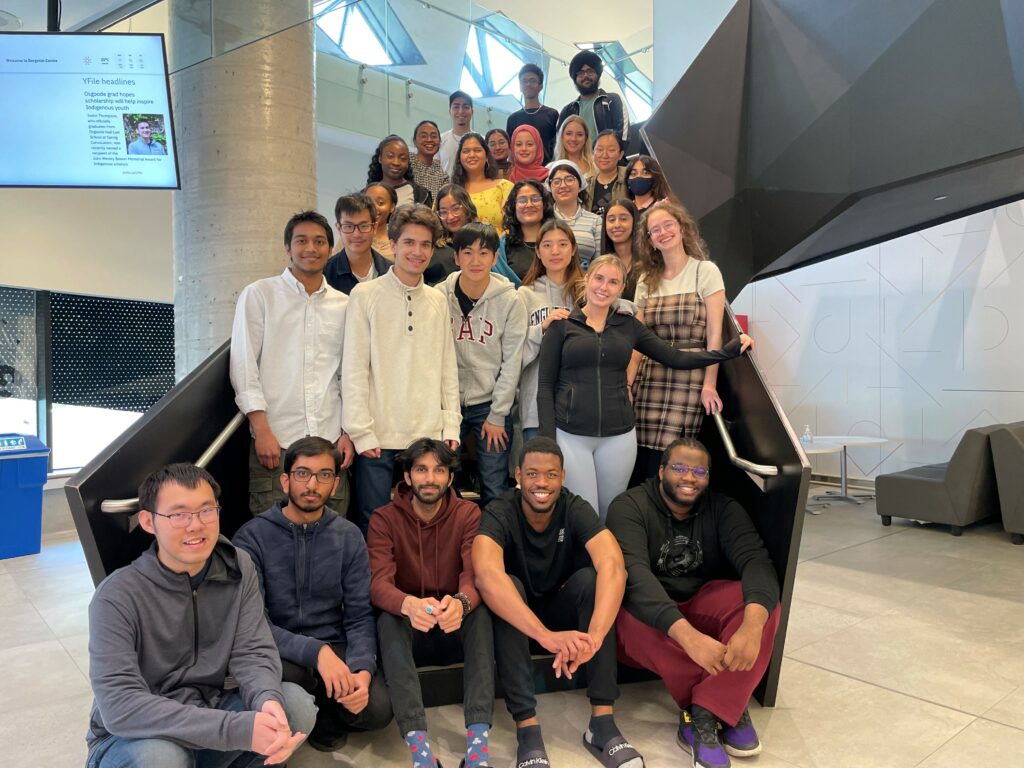
The Bringing STEM to Life: Work-Integrated Learning program at York University’s Lassonde School of Engineering’s k2i academy provides opportunities for students from under-represented groups entering Grades 10, 11 and 12 to participate in a paid summer research project experience aligned with the United Nations Sustainable Development Goals (UN SDGs), ensuring they have the broadest possible career choices in the future. A critical component: mentors from Lassonde’s co-op program.
“We are here to reimagine how STEM [science, technology, engineering and mathematics] education can look,” said Michelle Tsui-Woods, associate director of operations and development for the k2i academy.
A valuable by-product of the k2i academy’s work is its success in training university students as mentors and leaders, reflecting Lassonde’s commitment to Creating Opportunities and a Welcoming Community, a theme in its new Strategic Academic Plan.
Each summer, k2i academy hires York students for four months of full-time work as paid mentors and mentor leads for Bringing STEM to Life. A number of these students are part of Lassonde’s co-op program, chosen to reflect the diverse backgrounds of the high-school students they will be mentoring.
Lassonde’s co-op program is designed to offer students relevant curricular experience by offering them the opportunity to gain relevant, paid work experience throughout their academic journey. It allows them to put the theories they have learned in class into practice while building their professional networks and becoming acclimated to the workplace.

To participate in Lassonde’s co-op program, students must have completed at least two years of study at Lassonde. Through alternating academic and work terms, students are required to undertake at least three co-op terms with at least a single school term between them to provide them time to reflect on and absorb the lessons learned. After successfully completing co-op terms of at least 12 to 20 months, students earn a co-op designation on their transcripts and graduate with experience generally required for an entry-level role.
In two years, k2i has employed 34 co-op students, helping Lassonde to become York’s leading co-op employer. More than 50 per cent of these students have been women and they have represented eight of the 10 Lassonde undergraduate degree programs. For 90 per cent of them, it was their first co-op experience.
“A lot of co-op students are concerned when they begin their first co-op term because they feel they don’t have many skills,” said Mayolyn Dagsi, manager of the co-op program and business partnerships for Lassonde. “The k2i team has been intentional about building skills for these students, not only around engineering attributes, but as leaders. Survey data indicate that everyone who goes through a k2i co-op has enjoyed it and found it rewarding. For many of these students, the leadership experience and skills gained through their roles as k2i program mentors contributed to their success in obtaining their next work term in industry.”
As part of their work experience, k2i co-ops students gain outstanding leadership experience, given the nature of their positions. The focus of their job is to work in pairs as mentors to a team of eight to 10 high-school lab assistants and to lead them through a research project that is related to a faculty member’s own research and the UN SDGs, which are highlighted in York’s University Academic Plan and reflected as a theme in Lassonde’s Strategic Academic Plan.
“Under-represented students in STEM need networks and role models. One of the best ways to provide that is to connect undergraduate STEM students as mentors, who are close in age, to project teams,” said Tsui-Woods. “The k2i mentors design and create exciting learning opportunities for high-school students, including hands-on experiences connected to real-world engineering challenges. During the co-op experience, the k2i mentors learn about themselves as leaders, developing professional skills that will strengthen their future opportunities.”

Krishnika Raveendranathan, a space engineering student in her final year of study, joined the k2i academy for a summer co-op term and worked as a mentor in 2023. She and a fellow mentor worked with their group of about 10 high-school lab assistants to create a smart-sensing light system using machine learning.
“It was a great experience,” she said. “I really like to help and I really enjoyed working with the students. They were almost my own age, so it was more like working with friends, rather than a teacher-student relationship.
“Working as a k2i mentor allowed me to develop my leadership skills greatly, because as a mentor you were involved in a lot of teaching and delivering presentations to mentor the students. It was also about collaborating with other mentors and being open to insights.”
As July draws to a close, the mentors assist their team in preparing to present the results of their experiment at a STEM symposium with posters and demonstrations, so the mentors are busy coaching their teams in soft skills such as giving presentations and communication.
By August, as equipment is packed and stored, the mentors and mentor leads reflect on their experiences and learnings. They meet individually with k2i staff to review the summer, obtain feedback on their work and discuss growth opportunities. By September, they’re ready to return to their own classes, but – ideally – they are bringing stronger skills in leadership, mentoring, and diversity, equity and inclusion along with them.
“Building knowledge and experience in equity, diversity, and inclusion is an important part of transformational change in STEM education and STEM-sector industries,” said Lisa Cole, director of programming for the k2i academy. “Providing authentic experiences to build skills in practical applications within the workplace ensures that STEM undergraduate students become the kinds of leaders and changemakers our world needs.”
